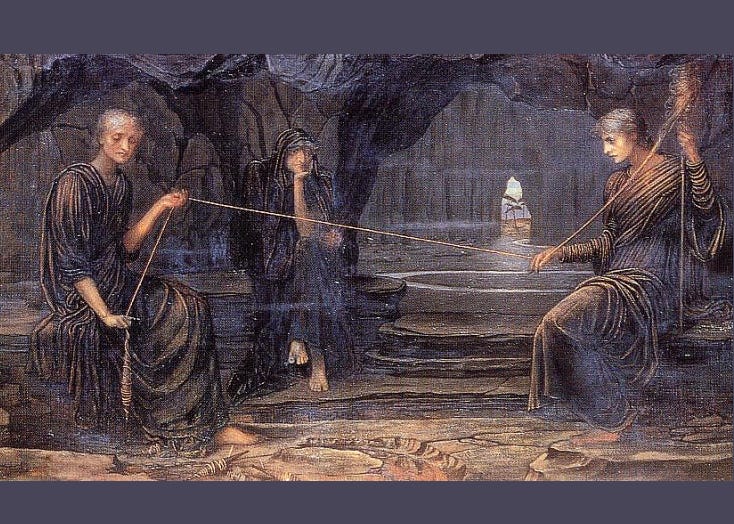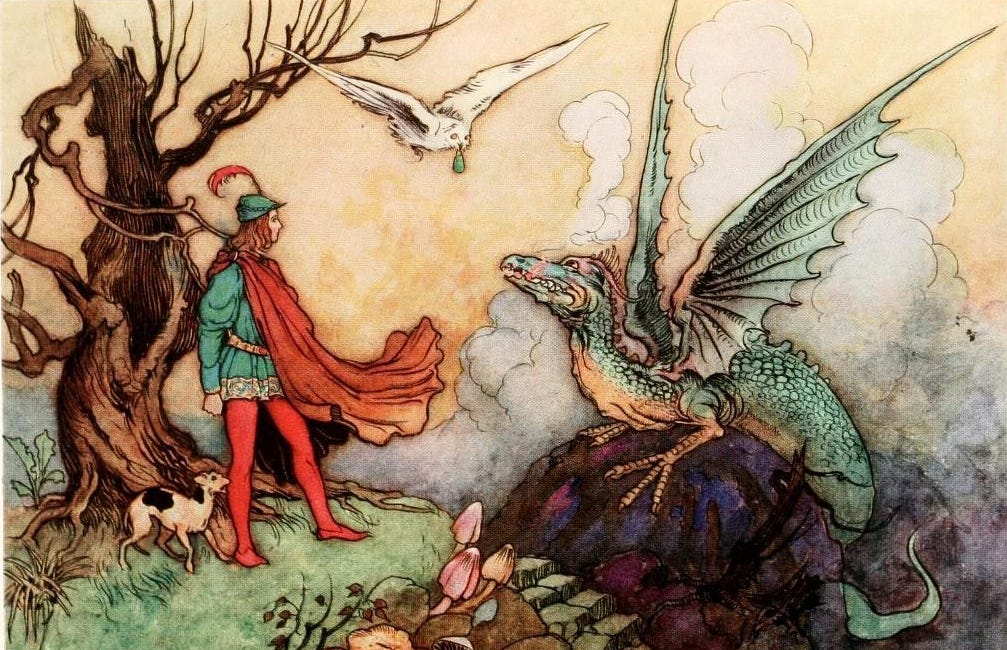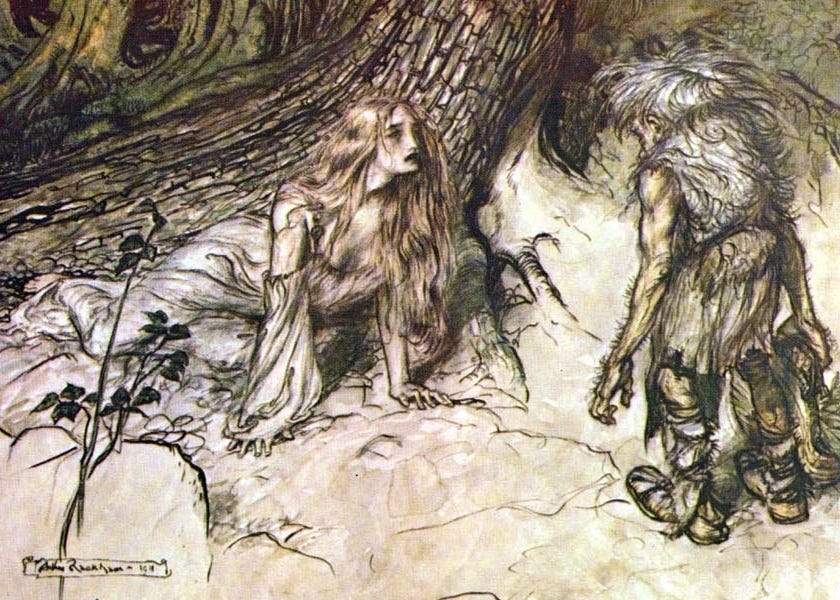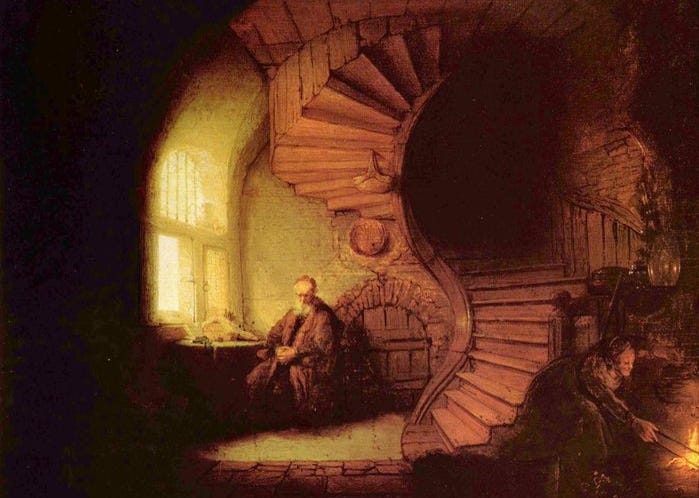When wrestling with the world you build, monsters can give you issues1.
Still worse awaits when you get into the entire question of the Powers That Be.
That is, polytheistic type gods, who are finite, contingent, caused, temporal in nature, and all the other limits, though they are actually also control the spheres of life they are gods of. If the god of death is imprisoned, people stop dying. (Otherwise they are just very powerful rational beings.2)
Contrary to some claims, putting in Powers That Be does not establish the base metaphysics of a fantasy world. Beneath this multiplicity of forces lies the question of how they came about, and what puts them in order.
These beings are so different from the monotheistic Supreme Being that someone can be both a polytheist and a monotheist. Plato was.
There is still a range there, where the implications differ.
Sometimes it is the god's very nature to have that sphere. The god is born with a skull for a head, and the midwife keels over, and thus the god of death appears. That has metaphysical implications, starting with that no one died before that.
At the opposite end, the celestial bureaucracy slots in a new god of death to fill the post, and his underlings keep things going more or less until then. And that has metaphysical implications in that the world set up by a bureaucracy, and run by it, and will stop running if the bureaucracy stops. How did that come about? Who appointed them? Did they seize this power?
Or the three most powerful gods, being brothers who overthrew their father, throw lots to determine their order. Then they get to pick which sphere is his domain in the order determined by the lot. But once he picks one, it's his, and he is the master of its forces. Even their sisters, in their domains -- why, one can, every year, stop growth for a season.
Whatever the means by which gods gain their spheres, whenever the author lends to the weight of his authority to their powers, there will be metaphysical implications brought with the gods.
Yet, most writers who bring the gods on stage do not consider this.
The gods generally turn into human beings with trivial differences, up to and including having higher powers of their own. (Turtles all the way up does not work any more than turtles all the way down.)
True, a god can be ignorant of much of the universe. He can also be pursuing his own purposes. The pagan philosophers who demoted them to daemons (not demons) thought they were evil in the same sense that men were evil, which makes them easier to characterize -- if not easy.
Still, the god should be godly. Either sage3 or showing bad judgment in a way related to the sphere of power. And this, even if the gods were once humans beings. Apotheosis should change people.
Yes, many myths show the gods behaving badly. But not in the infantile manner that many writers think shows something besides how infantile the writer's concept of the divine is. These also shrink your world because these are the beings running it.
Fleeting appearances, brief acts, or merely signs expand the universe by putting things outside the scope. The most impressive gods, the most numinous ones, are the most mysterious ones. It's the act that could be coincidence, or natural, that can carry the authentic ring.
Their spheres of influence can help with the necessary numinous touch. Slowly realizing that the sweep of greenery on a hill before you is also the green skirt of the goddess of plants -- which also helps explain why the visits have to be fugitive. (Perhaps the locations of her visits are lushly green forever after. Worse, the villain realizes it and scouts for those to look for his foes while they are still young.)
As an added bonus, fugitive visits help deal with the obvious problem of a literal deus even if the machina is still metaphorical. After all, the god either swamps the characters or forces them to match the god in power, if on stage for any long period of time. Brief appearances can dwarf the character and not derail the story, only add mystery and expand the world.
Putting the gods in disguise can help prolong their stay since it covers up many of the issues.
However.
Convincing disguises for gods take work. A lot of work. Enough work so that when the god stands revealed at the end -- or even the protagonist stares after the old beggar as he ambles off, chortling over the comment that means he might, or might not, have been a god -- it's convincing. Surprising, perhaps, in fact it's better writing when it's a surprise (if that's in character for the god), but convincing is more important.
At that, you need to use a god where taking the disguise and guiding the characters is convincing. If your plot is world-shaking, it may require direct divine guidance, and it takes little work to persuade readers that this is reasonable. (That it was this god, and that his actions were in character, takes more work.)
Lesser quests may require that you succeed in convey the inscrutable wisdom of the god, who, though finite, knows much and fathoms more than the characters he guides, so that it is believable that he had some purpose in his actions.
And that's even before you get into the questions of religion in the world.
Monsters, Magic, and The Mischief Of Metaphysics
You can do some fantasy without showing any metaphysics. Gryphons, firebirds, sea serpents, or other beasts. Some forms of functional magic. All sorts of flying carpets, cloaks of invisibility, amazing swords, and other enchanted items where the power to work magic is not in the hands of characters.
Metaphysics and Rational Beings
I was thinking about metaphysics and gods -- the gods of polytheism, being finite, contingent, caused, and temporal in nature -- and went off on a tangent about rational beings.
Sage Advice
When putting a character on stage and declaring this person is a sage, it's wise to take some things into consideration. Sages are difficult to present, and there is no greater way to show off the depth of your shallowness by the sagacity you give the sage.






I imagine all these questions are only made worse in stories that have more than one pantheon around, with none of them being any stronger than the other.
I recall one such setting for a tabletop RPG that didn't just have the various pagan/polytheist pantheons like the Greco-Roman, Egyptian, Voodoo (and its related religions), Hindu, etc., but also tossed in the ethical religions in their realm of Elysium. So you had Christian, Muslim, and Jewish saints and angels (with the angels having to pretend that nobody from the other religions had made it to Elysium). And Buddhist buddhas and bodhisattvas, Taoist immortals, and a variety of figures from mostly forgotten religions like Zoroastrianism.
The author got around any inconsistencies by stating that none of these were REAL gods (or God), they were just what people thought they were like. Which usually meant going with the nastiest interpretation possible "for dramatic reasons". At least he was even-handed in his scorn.
You could also try gods as egregores.